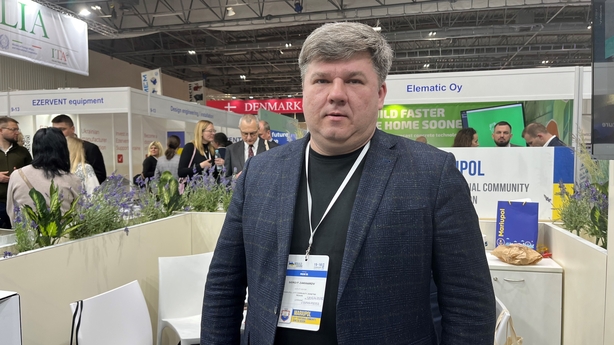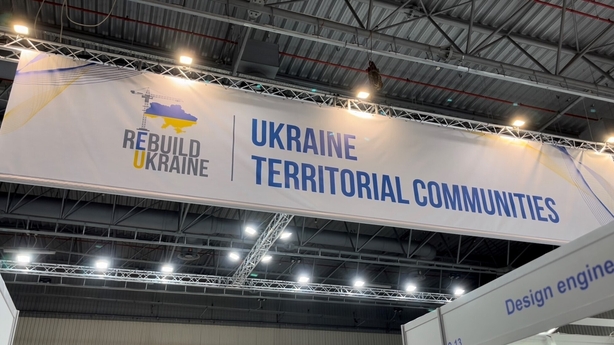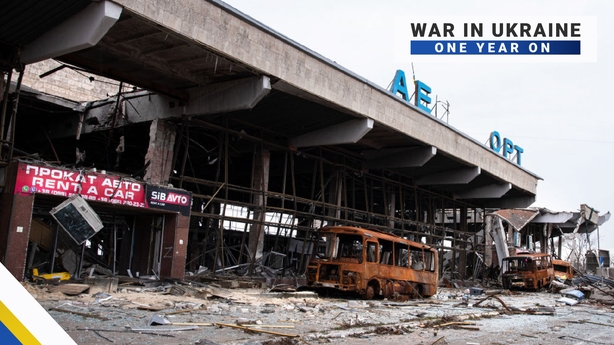
The war in Ukraine is far from over. But the race to rebuild many of the country's heavily damaged cities has already begun.
Earlier this week, more than 300 construction, engineering and technology companies from across Europe and the United States attended the Rebuild Ukraine exhibition in Warsaw in Poland.
They were there to meet delegations from 24 Ukrainian cities and municipalities, including Bucha, Irpin and Mariupol, whose infrastructure has been badly damaged or destroyed by Russia’s invasion.
The delegations – mostly comprised of deputy mayors, city engineers and architects – were hoping to attract foreign investment and strike reconstruction deals.
"We believe that 2023 will be the end of the war and people are going to return. Our first priority is to rebuild residential buildings for them to return to," said Sergiy Zakharov, deputy mayor of Mariupol, speaking to RTÉ News through a translator.

Mariupol remains occupied by Russian forces. The city and its inhabitants suffered from intense Russian bombardment. It was the scene of heavy street fighting early in the war.
Mr Zakharov said that 90% of the city’s buildings had been destroyed.
From Mariupol’s pre-war population of 550,000, approximately 120,000 to 150,000 of its residents remain living within the ruined city.
He holds out hope that it will be liberated this year, but acknowledges that any reconstruction will take until at least 2030 to complete.

The task of rebuilding Ukraine’s devastated cities is gargantuan.
Last September, the World Bank estimated that the cost of reconstruction and recovery in Ukraine amounted to $349 billion. Ukraine has endured five more months of war since then.
To put this in context, Ukraine’s pre-war annual GDP was approximately €200 billion.
Thousands of homes, schools, hospitals, factories and government buildings across the country have been destroyed since the start of Russia’s invasion 12 months ago.
Finding investors for reconstruction projects is difficult, especially given that Ukraine is at war and even harder still for occupied cities like Mariupol.
Kostiantyn Petrov, secretary of Izyum City Council told RTÉ News that his city needed €1.5 to €1.7 billion to rebuild the damage done during six months of Russian occupation.
Mr Petrov said that 35% of private housing in Izyum, a city in the eastern Kharkiv region, was damaged and 50% of the city's cultural buildings were destroyed.
"We had a lot of meetings. We’re looking for funds," said Mr Petrov.

War or no war, at the event in Warsaw, German engineers, French and Italian energy companies, British architects and Polish construction firms among others were keen to sign deals and put their technology to work.
"The main reason for Rebuild Ukraine is to speed up and intensify the financing of reconstruction and destroyed local communities all over Ukraine," Olena Kononenko, project director of Rebuild Ukraine told RTÉ News.
"We don’t want to build the same as it was before. We want it [to be] energy efficient, we want it to be modern and very convenient for the people who will use these facilities in their communities, who will come back [from being refugees] to their native towns," said Ms Kononenko.
Many companies at the event were touting their expertise in the use of recycled materials, particularly when it comes to reusing concrete from rubble.
Roco, a demolition and recycling company based in Crossmaglen, Co. Armagh was the sole representative from the island of Ireland at the expo.
Hubert Watson, sales director at Roco, said that rubble from destroyed houses could be used as a "sub-base" for road reconstruction in Ukraine.

Neo-Eco, a French engineering company specialising in recycling materials, has been working in Ukraine for the past eight months.
It plans to build 450 apartments in Hostomel near Kyiv by early 2024. Approximately 80-90% of the materials used in the project will come from damaged buildings.
Ukraine’s President Volodymyr Zelensky has repeatedly called for a Marshall Plan for the twenty-first century to reconstruct Ukraine.
One novel idea over how to finance Ukraine’s reconstruction costs has been floated by European Council President Charles Michel: use $300 billion in frozen Russian central banks assets.
"We are hopeful. If we did not have this hope in our minds we would not start this project until the war is over. But the main point is that the war is still on. We are already preparing ourselves for a new era," said Ms Kononenko.







